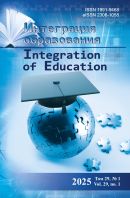UDK 37.016:811.111
DOI: 10.15507/1991-9468.094.023.201901.023-036
Language and Cultural Awareness of a Non-Native ESP Teacher
Rafael F. Forteza Fernandez
Associate Professor of Chair of Foreign Languages and Translation, Ural Federal University named after the First President of Russia B. N. Yeltsin (19 Mira, Ekaterinburg 620002, Russia), Dr.Sci. (Pedagogy), ORCID: https://orcid.org/0000-0001-5356-5337, Researcher ID: R-8717-2017, rafaelforteza@gmail.com
Maria del C. Batista Gonzalez
Professor of the Language Center at the Institute of Basic Sciences, Higher Technical Institute of Havana – CUJAE (11901 e/114 Ciclovia y Rotonda, La Havana, Marianao, Cuba), Dr.Sci. (Pedagogy), ORCID: https://orcid.org/0000-0002-6137-8627, Researcher ID: A-8424-2019, maricarmen@arquitectura.cujae.edu.cu
Introduction. The relation between culture and language is a central issue in foreign language teaching and research where the need to give cultural content the same value as language content and language skills has been stressed. However, conceptualization of teacher language awareness, by focusing largely on formal aspects of language, largely neglects culture as a component of teacher cognition. This paper expands the category of ESP-teacher language awareness suggesting the inclusion of cultural awareness as a separate component of teacher cognition. This concept extension actualizes ESP teaching in the situation shaped by unprecedented mobility and intercultural contacts.
Materials and Methods. The historic-logical method was used to determine shortcomings of pedagogical experience and the need to teach culture in ESP. Grounded theory, as an inductive methodology, was utilized to generate conceptual expansion theoretically tied with research in medical and business communication as well as with data on population movement and international s cientific cooperation.
Results. We defined ESP-cultural knowledge as a system comprising the permanent (know-that) and temporary (know-of) cultural manifestations in a society as well as how they are manifested through language (know-how). That system practical representation is exemplified in medicine and business English discourse. The study expands the structure of ESP-TLA, claiming the focus on cultural awareness as part of ESP discourse which fosters cultural-response education.
Discussion and Conclusion. Such claim is pertinent to practitioners involved in the tourism industry, health care, economics, and academic activities such as research and development. This paper is relevant for teachers of English for Specific purposes in the fields mention ed above as well as for researchers engaged in analyzing the problems and methods of teaching a foreign language. However, because of the multiple manifestations and complexity of student motivation to get ESP course, the paper acknowledges the difficulties in addressing cultural content salient to all student s in class, an aspect meriting further research..
Keywords: ESP, teacher language awareness, communicative language practices, knowledge of subject matter, culture
Acknowledgements: This research was financially supported by the Russian Foundation for Basic Research (Grant No. 17-29-09136/18 «Multilingualism in the era of post-literacy: Philosophical and cultural studies and methodological and pedagogical development of a multilingua l education model»).
For citation: Forteza Fernandez R.F., Batista Gonzalez M. del C. Language and Cultural Awareness of a Non-Native ESP Teacher. Integratsiya obrazovaniya = Integration of Education. 2019; 23(1):23-36. DOI: 10.15507/1991-9468.094.023.201901.023-036
Contribution of the authors:
Rafael F. Forteza Fernandez – scientific management; preparation of the initial version of the text; providing the necessary critical analysis and revision of the text; development of the methodology; typing, correction, and edition; formal data analysis.
Maria del C. Batista Gonzalez – exploring concepts; collecting data, and evidence.
All authors have read and approved the final manuscript.
Submitted 09.11.2018; revised 08.12.2018; published online 29.03.2019.

This work is licensed under a Creative Commons Attribution 4.0 License.






























